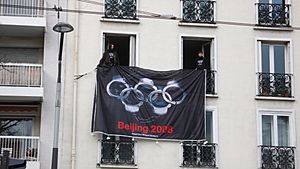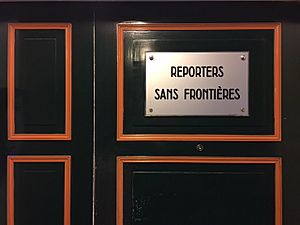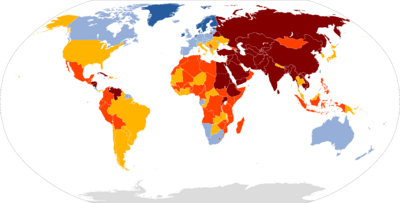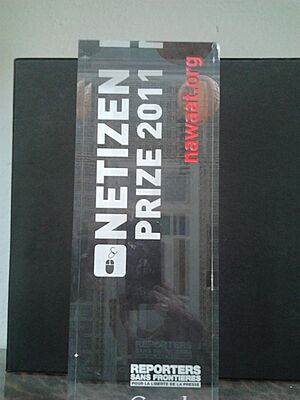Reporters Without Borders facts for kids
|
Reporters Sans Frontières
|
|
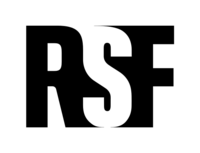
Logo since 2020
|
|
| Formation | 1985 |
|---|---|
| Founder | Robert Ménard, Rémy Loury, Jacques Molénat and Émilien Jubineau |
| Type | Nonprofit organisation, non-governmental organisation with consultative status at the United Nations |
| Headquarters | Paris, France |
|
Director General
|
Thibaut Bruttin (since November 2024) |
|
Key people
|
Thibaut Bruttin, Secretary General Pierre Haski, President RSF France Mickael Rediske, President RSF Germany Christian Mihr, CEO RSF Germany Rubina Möhring, President RSF Austria Alfonso Armada (writer), President RSF Spain Gérard Tschopp, President RSF Switzerland Erik Halkjær, President, RSF Sweden Jarmo Mäkelä, President, RSF Finland |
|
Budget
|
€6 million (RSF France) |
|
Staff
|
Approximately 100 |
Reporters Without Borders (RSF), also known as Reporters sans frontières in French, is a group based in Paris, France. It is a non-profit organization that works to protect the right for everyone to get and share information freely.
RSF believes that everyone needs to have access to news and information. This idea comes from a big international rule called Article 19 of the Universal Declaration of Human Rights. It says people can get and share information no matter where they are. RSF works closely with important global groups like the United Nations and UNESCO.
Contents
What RSF Does
RSF works to defend journalists who are in danger. They also work with governments and international groups to protect the right to freedom of expression and information.
- Daily Updates: RSF shares daily news and updates about threats to media freedom. They do this in many languages, including English, Spanish, and Chinese.
- World Press Freedom Index: Every year, RSF publishes a report called the World Press Freedom Index. This report checks how free the media is in 180 countries around the world.
- Helping Journalists: The organization helps journalists who are at risk. They offer training on how to stay safe online and in person.
- Raising Awareness: RSF runs campaigns to make people aware of problems faced by journalists. They work to keep journalists safe and free.
- Legal Action: They also take legal steps to defend journalists who are in trouble.
- Counting Casualties: RSF keeps track of how many journalists are killed while doing their job each year.
On World Day Against Cyber Censorship in March 2020, RSF named 20 "Digital Predators of Press Freedom." These are groups or people who try to stop news from being shared online. RSF also announced that it was unblocking 21 websites as part of its "Operation Collateral Freedom" project.
RSF's History
RSF was started in Montpellier, France, in 1985. Its founders were Robert Ménard, Rémy Loury, Jacques Molénat, and Émilien Jubineau. It became a registered non-profit organization in 1995.
Christophe Deloire was the secretary-general of RSF from 2012 until he passed away in June 2024. Thibaut Bruttin became the new secretary-general in November 2024.
How RSF Is Organized
RSF's main office is in Paris. It has 13 other offices around the world, including in Brussels, London, Washington, and Berlin. They also have a network of 146 correspondents, who are like reporters or representatives, in different countries.
About 100 people work for RSF in Paris and other offices. A group called the board of governors makes decisions about the organization's plans. An International Council also checks RSF's activities and approves its money matters.
Important Projects
Information and Democracy
In 2018, RSF started the Information and Democracy Commission. This group works to create new ways to protect freedom of opinion and expression around the world.
The leaders of this commission, Christophe Deloire and Nobel Prize winner Shirin Ebadi, talked about things that threaten freedom of information. These include governments controlling the media and false information spreading online.
The commission wrote a document called the International Declaration on Information and Democracy. This document explains rules and goals for how information should be shared online globally. It says that big online companies have duties, like being fair and allowing many different viewpoints. It also says people have a right to diverse, independent, and reliable information. This helps them form their own opinions and take part in democratic discussions.
In 2018, 12 countries agreed to work towards these goals at the Paris Peace Forum.
Journalism Trust Initiative
RSF launched the Journalism Trust Initiative (JTI) in 2018 with other groups like the European Broadcasting Union. JTI helps to find and support trustworthy journalism. It sets standards for good journalism and rewards news outlets that follow them.
JTI looks at how journalism is done, not just the stories themselves. News organizations must be clear about who owns them and where their money comes from. They also need to show they follow professional rules. This helps create a healthy space for information.
World Press Freedom Index
The World Press Freedom Index is a yearly report published by RSF. It measures how free journalists are in 180 countries. The index helps people understand where press freedom is strong and where it is in danger. It uses different colors to show the level of freedom, from "Good" to "Very serious."
RSF's Actions
RSF defends journalistic freedom in many ways. They send teams to different countries, publish reports, and train journalists. They also hold public protests.
RSF uses the Munich Charter, a document that explains the "Rights and Obligations" of Journalists. This charter helps guide their work.
Some of RSF's recent actions include:
- Opening a center for women journalists in Afghanistan in 2017.
- Protesting for Turkish journalists who were held in prison.
- Turning off the lights of the Eiffel Tower to honor Jamal Kashoggi, a Saudi journalist who was murdered.
- Providing training to journalists and bloggers in Syria.
- Sending a team to Saudi Arabia in 2018 to ask for the release of 30 journalists.
RSF also has an online "Press Freedom Barometer." This tool tracks how many journalists, media workers, and citizen journalists are killed or put in prison. Their "Operation Collateral Freedom" project, started in 2014, helps people access censored websites. It does this by creating mirror sites, which are copies of the blocked websites. So far, 22 sites have been unblocked in 12 countries, including Iran and China.
RSF also gives money to journalists who are at risk. They help media workers who need a safe place to live and work.
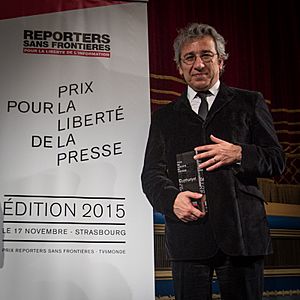
Prizes RSF Gives
RSF has given out its annual Press Freedom Prize since 1992. This award honors brave and independent journalists who have faced threats or been imprisoned for their work. It celebrates those who have stood up against people who abuse power.
In 2010, RSF also started the Netizen Prize with Google. This prize recognizes people, including bloggers, who have helped freedom of information online. They might do this through investigative reporting or other projects.
Since 2018, the Press Freedom Prize has new categories: courage, independence, and impact.
How RSF Is Funded
In 2022, RSF's budget was about €8 million. About half of their money comes from governments. Other money comes from foundations, business activities, and public donations. Some foundations that support RSF include the American Express and the Ford Foundation.
In 2005, RSF was criticized by some for taking money from certain groups. RSF explained that the money was a small part of their budget and was used to help African journalists.
Awards RSF Has Received
RSF has received many international awards for its work:
- 1992: The "Lorenzo Natali Prize" from the European Commission.
- 1997: The "Journalism and Democracy Prize" from the Organization for Security and Co-operation in Europe (OSCE).
- 2005: Shared the European Parliament's Sakharov Prize for "Freedom of Thought."
- 2006: The "Asia Democracy and Human Rights Award" from the Taiwan Foundation for Democracy.
- 2009: Shared the "Roland Berger Human Dignity Award" with Nobel Peace Prize winner Shirin Ebadi.
- 2019: The Dan David Prize, for defending democracy.
See also
 In Spanish: Reporteros Sin Fronteras para niños
In Spanish: Reporteros Sin Fronteras para niños
 | Janet Taylor Pickett |
 | Synthia Saint James |
 | Howardena Pindell |
 | Faith Ringgold |


